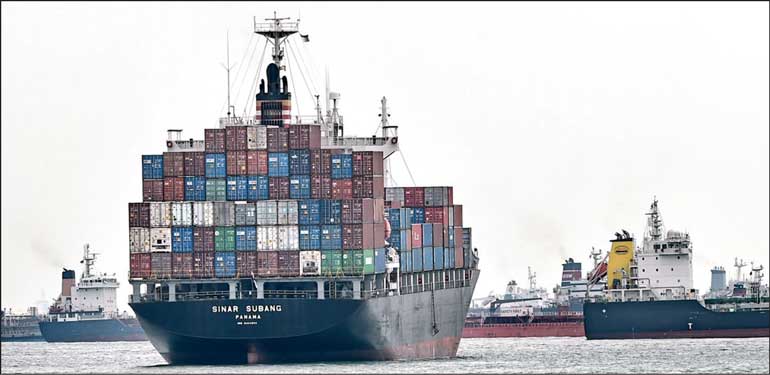Friday Feb 20, 2026
Friday Feb 20, 2026
Friday, 6 June 2025 00:22 - - {{hitsCtrl.values.hits}}

It is challenging to stimulate growth with high debt burdens while earning profits and returns to reduce debt levels in sagging economies
 The unilateral declaration of reciprocal tariff by President Donald Trump on trading partner countries has unfolded myriad uncertainties heightening the geopolitical and economic tensions. Immediate reactions were reflected in the global stock markets trading on negative levels. The full repercussions will be known in a couple of years. The IMF has forecasted a downward economic growth for the USA.
The unilateral declaration of reciprocal tariff by President Donald Trump on trading partner countries has unfolded myriad uncertainties heightening the geopolitical and economic tensions. Immediate reactions were reflected in the global stock markets trading on negative levels. The full repercussions will be known in a couple of years. The IMF has forecasted a downward economic growth for the USA.
Prof. Jeffrey Sachs, Economist and Professor at Columbia University, who is critical of President Trump’s decision, argues; that even in this turmoil few billionaires who are close to the Trump administration would have made a killing. The erratic market fluctuations are real opportunities for those who aspire for state and regulatory capture in the current context. They cash on pains and losses of millions and gain handsomely. That is their business. Quickly recouping the money spent on election campaigns with the help of information asymmetry.
The mythical beliefs of ownership society benefitting out from trickle down effects remains as pie in the sky. Blind faith in the neo-liberal order has not ushered any worthwhile progress to billions of people struggling to meet their ends, fighting for a dignified upward social mobility in search of better quality of life. Instead, the neo-liberal doctrine aligned with market fundamentals practiced for decades have widened inequality in income, wealth, education and healthcare in strong economies and in the developing countries.
Thus, in many democracies the hopeless and helpless citizens are electing extreme right- or left-wing populist governments into power for alternative policy options in the absence of any other choice. As for many, hope is the antidote for fear. It appears that many who secure electoral gains lack original thinking for better alternative policy options to stimulate growth in the sagging economies pickled with debt, including the USA. Instead sticking to the same old failed economic policy options for survival.
In these uncertainties elections are won by effectively managing misinformation. Social media giants are providing the templates to navigate hope, deceive the public mainstreaming populism, dividing the society blaming the elites, and someone else for the miseries they undergo resulting from ill-conceived policy directives of the past. Though the politicians cashing on this uncertainty with electoral gains, holding onto the electoral mandate secured and delivering the promises to the citizens remains a challenge.
Trade deficits caused by weakened productivity in the real economy
Taxes and tariffs are the main revenue streams for governments to manage the economy. Over decades, there has been a mismatch between state revenues and expenditures. Instead of stimulating growth through increased productivity, consumption was encouraged through higher debt levels, which have grown disproportionately in both developed and developing countries.
This trend has widened inequality and injected cheap money into high-risk corporate ventures, earning quick returns through speculation, now popularly known as Casino Capitalism. Government revenues have become heavily linked to consumption taxes. Over the years, under the neo-liberal dogma, huge tax concessions were given to corporations, and tax havens were set up to hide wealth created in formal economies. The major source of income for governments came from consumption taxes and tariff revenues, worsening the cost of living for the average citizen.
High-net-worth corporations and political activists still anticipate tax concessions to thrive in their wealth accumulation. However, it is challenging to stimulate growth with high debt burdens while earning profits and returns to reduce debt levels in sagging economies. Balancing between these two interest groups remains a real challenge.
Fareed Zakaria, in his popular CNN program “The War on Government” (25/05/2025), reveals that under Presidents George W. Bush and Donald Trump, tax concessions bestowed to high-net-worth individuals amounted to $ 10 trillion, equivalent to 57% of US debt to GDP levels. In Sri Lanka, under President Gotabaya Rajapaksa, Rs. 600 million was given away as tax concessions, moving from casino to crony capitalism, worsening the debt situation in the country on top of the infamous 30 billion bond issue under the Yahapalana regime.
The full global market portfolio of tradable financial assets sums up to $ 271 trillion. Fixed income securities, mostly debt instruments, account for $ 116 trillion, nearly 54%. According to the analysis of www.ocorian.com, private assets grew three times as fast as public assets over the past 15 years. This underlying causal factor for widening inequality in economies drives billions of marginalised individuals into hopelessness and helplessness, creating opportunities for populist politics. The facts reveal that resources are abused by a few to gain through distributions across capital markets, rather than driving growth in the real economy for shared prosperity for all.
The three “D” threats and dangerous trends
Deplorable Debt, Degraded Environment, and Depleted Natural Resources are the three “D” problems threatening the sustainability and habitable coexistence of humankind. The fake prosperity of the past few decades was only possible through exploitation within an unsustainable linear economic model, leading to these highlighted 3D problems. Among them, Deplorable Debt is particularly troubling for the US economy. President Trump’s economic policy tools, including tariff hikes, aim to curb the demand for US dollars, assuming that a lower-valued currency will ease debt burdens.
The dominance of the US dollar as a world reserve currency has increased its demand at a higher value. Those holding US dollar-denominated assets booked fictitious profits by applying market revaluation principles. Additionally, oligopolistic American credit card companies have cloned debt levels, increasing consumption and drying up sufficient credit to stimulate growth in production in the real economy across all regions.
Global credit card giants clone debt with ease and thrive on the cash flows generated, leaving central banks and monetary authorities to control inflation at negative or near-zero interest rates. Some credit cards levy 28% as a penal rate of interest. In this unhealthy policy divergence, private debt often accumulates as public debt, ultimately adding up to unmanageable sovereign debt. Consequently, many multinational corporations have earned unrealistic rewards through intervention in the resource distribution process instead of investing to trigger growth in the economy. Excessive financialisation through debt now threatens the entire financial architecture established since the end of WWII.
“The dollar is our currency, but it’s your problem” John Connally – 1971
There are two historic events when the US dollar became uncompetitive and the American Presidents had to take decisions to bring the value down. In 1971 President Richard Nixon signed the Smithsonian Agreement proclaiming it as the most significant monetary agreement in the history of the world. The second, Plaza Accord under President Ronald Reagan in September 1985. Neither the Smithsonian Agreement nor the Plaza Accord lasted very long, writes Prof. Harold James, Professor of History and International Affairs at Princeton University. He cites a quotation from President Nixon’s Treasury Secretary John Connally telling Europeans “The dollar is our currency, but it’s your problem”.
Even after 50 years the dollar has been their problem too. In both cases, a US president believed that the dollar was overvalued, that American exporters and workers were disadvantaged, and that US economic policy had been blocked by foreign obstruction. President Donald Trump too faces the same situation and unravelled the reciprocal tariff measures under the new Mar-a-Lago Accord in the making.
The untested “Bitcoin Reserve”
The media reports that Trump Media and Technology Group, the parent company of Truth Social, is raising $ 2.5 billion through a stock and bond sale aiming to build a corporate bitcoin reserve, mirroring President Donald Trump’s pro-crypto agenda to fund a bitcoin reserve.